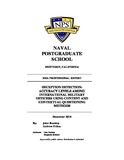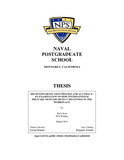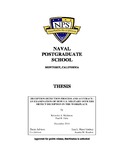Deception detection: accuracy levels among international military officers using content and contextual questioning methods
| dc.contributor.advisor | Lindsey, Lisa | |
| dc.contributor.advisor | Roberts, Benjamin | |
| dc.contributor.author | Buckley, John | |
| dc.contributor.author | Frӓnz, Andrew | |
| dc.date | Dec-16 | |
| dc.date.accessioned | 2017-02-09T00:02:58Z | |
| dc.date.available | 2017-02-09T00:02:58Z | |
| dc.date.issued | 2016-12 | |
| dc.identifier.uri | https://hdl.handle.net/10945/51656 | |
| dc.description | MBA Professional Report | en_US |
| dc.description.abstract | This MBA research project is an extension and replication of recent diagnostic utility studies to determine if the methods used are (a) generalizable to a new population and (b) useful in identifying specific questioning strategies relevant to international military officers. Research conducted by Charles Bond and Bella DePaulo in 2006 indicated, on average, people are slightly better than fifty-fifty at detecting deception, as seen in a published Personality and Social Psychology Review article. Modern research ideology favors using diagnostic utility, which is the use of comprehensive questioning methods. In the past, a clear majority of researchers relied solely on verbal and nonverbal indicators to aid in deception detection. This new research uses specific questioning techniques that have been proven more reliable in determining deceptive behavior. Results from the quantitative analysis conducted in Study 1 exhibited that international military officers considered non-experts outperformed experts in their ability to detect deception. In addition, those considered experts performed better than previous research indicated, and the accuracy rate improved as content and contextual questioning methods were implemented. Results from the qualitative analysis conducted in Study 2 established that international military officers combined information obtained from other sources along with physical observations when detecting deception. | en_US |
| dc.description.uri | http://archive.org/details/deceptiondetecti1094551656 | |
| dc.publisher | Monterey, California: Naval Postgraduate School | en_US |
| dc.rights | This publication is a work of the U.S. Government as defined in Title 17, United States Code, Section 101. Copyright protection is not available for this work in the United States. | en_US |
| dc.title | Deception detection: accuracy levels among international military officers using content and contextual questioning methods | en_US |
| dc.type | Thesis | en_US |
| dc.contributor.department | Graduate School of Business and Public Policy (GSBPP) | |
| dc.subject.author | international | en_US |
| dc.subject.author | international military officers | en_US |
| dc.subject.author | deception | en_US |
| dc.subject.author | deception detection | en_US |
| dc.description.service | Technical Sergeant, United States Air Force | en_US |
| dc.description.service | Captain, United States Air Force | en_US |
| etd.thesisdegree.name | Master of Business Administration | en_US |
| etd.thesisdegree.level | Masters | en_US |
| etd.thesisdegree.discipline | Business Administration | en_US |
| etd.thesisdegree.grantor | Naval Postgraduate School | en_US |
| dc.description.distributionstatement | Approved for public release; distribution is unlimited. |
Files in this item
This item appears in the following Collection(s)
-
1. Thesis and Dissertation Collection, all items
Publicly releasable NPS Theses, Dissertations, MBA Professional Reports, Joint Applied Projects, Systems Engineering Project Reports and other NPS degree-earning written works. -
7. Master of Business Administration (MBA) Professional Projects





